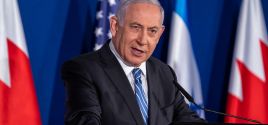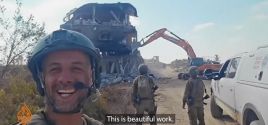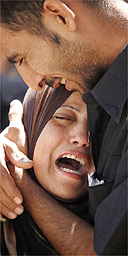Scared to flee ... even more scared to stayA growing flood of humanity is desperately fleeing the Israeli bombardment of LebanonThe Observer Jul. 23, 2006 |
Popular 
Netanyahu Won't Commit to Not Striking Iranian Nuclear or Oil Sites But Will 'Consider' U.S. Warnings

Lufthansa Fined Record $4M for Alleged 'Discrimination' Against Jewish Passengers

'The First Live-Streamed Genocide': Al Jazeera Documentary Exposes Israeli War Crimes in Gaza

WashPo: Netanyahu Tells U.S. That Israel Will Not Strike Iranian Nuclear or Oil Sites

Bill Kristol: My Fellow White Americans Are 'The Enemy'
  A massive refugee flight from southern Lebanon was under way yesterday as tens of thousands of mainly Shia civilians took to the roads after almost a fortnight of relentless Israeli attacks. A massive refugee flight from southern Lebanon was under way yesterday as tens of thousands of mainly Shia civilians took to the roads after almost a fortnight of relentless Israeli attacks.From dawn yesterday, hundreds, then thousands, of cars and rusty trucks choked the narrow mountain roads leading towards Beirut from the bombed and impassable coastal road. Whole extended families were on board. Many had been forced to abandon all they owned. They came in taxis, buses and private cars, trailing improvised white flags from their windows or with bed sheets slung across their roofs - scant protection from the Israeli jets. The beleaguered country is facing a humanitarian catastrophe on an enormous scale with more than half a million civilians already displaced and hundreds of thousands more under 'orders' from the Israeli military to evacuate a 20-mile deep zone south of the Litani river. Amid warnings from the World Food Programme that hundreds of thousands of people are already finding it difficult to find food, mayors in areas away from the heaviest bombardment have told The Observer they are being overwhelmed by refugees flooding from the country's south and Beirut's southern suburbs, and are just days from a humanitarian crisis. With roads and bridges bombed by the Israelis and large areas of the country under artillery bombardment, aid workers have only been able to contact the most seriously affected areas by phone. They have warned that tens of thousands of elderly, women and children are in danger in the worst-hit areas. The problems have been exacerbated by the huge reliance of Lebanon on imported food - almost 90 per cent - with the World Food Programme estimating that supplies within the country are sufficient to last between one to three months at most. The UN warned yesterday the situation in Lebanon was 'deteriorating by the hour'. Its humanitarian chief, Jan Egeland, is due to arrive in Beirut to assess the crisis on the ground, as Lebanese civilians flee north amid fears of a large-scale Israeli ground invasion. Egeland said half a million people needed assistance - and the number was likely to grow as Israeli troops continued to expand their military operations inside Lebanon. There was little comfort for those fleeing through the mountains yesterday. Most cars were packed with families, children on adults' knees, some crushed eight to a vehicle. Others who travelled by taxi northwards reported paying $100 per passenger to escape to Beirut - or $1,000 for a family. Those forced to leave on the open backs of trucks suffered most, exhausted, sunburnt and dehydrated as they crawled through the traffic jams that had gridlocked the Druze mountain villages. Refugees described gruelling journeys from the besieged city of Tyre and the towns and villages south of the Litani river, where some 300,000 people were ordered to evacuate by leaflets dropped late last week from Israeli aircraft. Most had little idea where they were fleeing to, only that they could no longer remain in their homes under Israeli attack. Most said they were heading for Beirut or the Syrian border. Few wanted to stop and talk, fearful of being exposed on the roads to Israeli bombs. But those who did spoke of towns suffering days of bombing, of deaths and damaged houses and bodies buried in the rubble. They described, too, how only those wealthy enough or with cars could escape areas running rapidly out of fuel and food. Among those who had fled Terdeeba, four miles from Tyre, was Maryam Leban, who, with her parents had taken refuge in a school in the Shouf mountain town of Daraya. 'Everyone is making their own decision on when to leave. Some families are left but not many,' she said. 'We had to get out because they were hitting the whole area. Forty-five houses in the village were damaged. We do not know how many were killed because we could not leave the house.' Suddenly a white van draped with bed sheets pulled up, just arrived from Terdeeba. As those already in the school hugged the men inside, the eldest - who would not give his name - said: 'It was difficult. Very difficult. There were cars on the road that had run out of petrol. But no one could stop to help. People also tried to tell us to turn back. They said it was too dangerous. But we could not stay, so we came. There is almost no one in the village now.' The majority of refugees encountered by The Observer were escaping from Tyre and its surrounding villages, which have suffered days of Israeli bombardment so heavy that, during a brief lull on Friday, the city was forced to bury more than 80 of its dead in a hastily dug mass grave. Down from the mountains - on the coastal plain - the cities that border the Mediterranean appeared largely deserted as a vast plume of black smoke billowed from the ruptured fuel tanks of the Jieh power plant, hit by missiles from an Israeli Apache helicopter last week. The huge movement of civilians will only exacerbate the crisis in Lebanon, which has already seen the flight of most of Beirut's southern suburban population who have suffered days of bombing. Refugees have fled to places such as the Shia village of Keyfoun in the Shouf mountains above Beirut, usually home to a few thousand people. In winter its population is 2,000. In summer, when the wealthy Shia from Beirut come up on holiday to their summer homes, it rises to 5,000. Last week the number of those living in this mountain village hit 40,000 as refugees arrived. In Keyfoun - as elsewhere across the country - people sleep crowded in school classrooms, in half-built housing blocks, public buildings and in the village's solitary hotel. Mostly, though, they stay in other people's houses - three and even four families to a home. The refugees in Keyfoun are by and large the lucky ones - at least there is food to be had if you have the money - but it is full to bursting. On a single day 240 new families arrived; the municipality had to refuse refuge to any more. Yet still you see them coming up the twisting roads, cars packed with bedding. Twenty thousand of those who have come to Keyfoun have come from the area of Bourj al-Barajneh, near Beirut's international airport, target of the first Israeli air raids and now largely deserted. The thin foam mattresses that you see stacked against shop doors sell for $30. Blankets go for the same price, with six or seven being shared among up to 20. Keyfoun's water, delivered from the Barouk river twice a week into a million-litre tank, lasts barely an hour. Many still have money for food: staples like eggs and rice and sugar are becoming more difficult to find. War profiteering has doubled or even trebled in price. Typical of those displaced, Ali Ghassan, 58, a former prisoner of the Israelis, is from Tyre. A truck driver and supporter of Hizbollah, he says he left only because of his young children. He wants no help from the outside world, only for Israel to be destroyed. 'I built my house two times because of war. I do not wish to have build it a third time.' Close to the epicentre of last week's attack - a building looking much as locals claim it was, a half-built mosque - only a handful of families remain. Among them is Hasna Shahabeldeen, 40, who was in her apartment when the bombs fell. While the rest of her family fled, she elected to remain. 'There are only four or five families left near here. People have tried to persuade me to go. But I will stay. If necessary I'll die here,' she said. Israel lifted its blockade of Lebanon's ports yesterday to allow in aid. A Greek warship carrying 22 tons of humanitarian supplies arrived in Beirut last Friday, followed by another with 14 tons of supplies yesterday. An Italian navy ship was expected today. The next task is to distribute the aid: it is still unclear how it will get to isolated towns where roads have been cut off by Israeli strikes and trucks remain a target for Israeli war planes. 'Everyone is worried' The Lebanese student: Shoghig Mikaelian, 23, is a student at the International Affairs at the Lebanese American University in Beirut Just 15 to 20 days ago people were watching the World Cup and lighting up the skies with fireworks. Today, everyone is worried about what is yet to come. People have been rushing to the markets to buy as much food as possible. Our youth used to drive around with flags of their favourite political parties, now the only cars you can see are those rushing up to the mountains. Our family business has come to a complete stop. We no longer open up , since the area close to the port where we are located is unsafe and many of our customers are from the southern suburbs, which have been reduced to a pile of rubble. When we have electricity, all we watch is the news on local channels, sometimes taking a peek or two at what British or American stations have to say. Despite the current disastrous humanitarian situation in the country, we continue to think that the more serious and tangible catastrophic implications will surface when this "crisis" comes to an end. The schoolboy: Israeli schoolboy Eugene Webster, 17, is in a bunker in Haifa Even if nothing happens, it affects you psychologically. My family and I are used to it by now, but at first it made me nervous. I'm really missing going outside. I used to hear the birds, but no birds nowadays. I am with my brother and parents. And my grandmother has moved in for the time being as her area is less safe. On her way here she was near where the rockets hit. She heard three booms but didn't turn around to see the rockets. It's like being under house arrest. I can only hope that this will resolve in the next few weeks; that we will get the kidnapped soldiers back and that other countries won't have to be dragged into a war with Iran and Syria. We have enough food and water. If we run out of food my father will go to the store at night since rockets are not fired then. We come here when we hear sirens. I write my blog, read and play my guitar. The father: Noam Shalit, right, is the father of Gilad Shalit, the Israeli soldier seized in June, sparking Israel's Gaza offensive and heralding the present crisis. He lives in Hila, near the Lebanese border The Israelis in this area are mostly supporting the government and action being taken in Lebanon. Israelis are willing to suffer this burden and overcome it and gain some achievement. I am not a political expert and I am not a military expert. All I want now is to end this crisis and bring my son back. When this war will be finished, maybe we will be able to go back to the point before this began. Don't forget there are two other kidnapped soldiers. It's another issue that has to be handled. Hizbollah dragged us to a war we did not want and we did not start. We would like to live in peace with Lebanon. It's like a bad dream. The Palestinian: Mark Rashed, 42, is a Palestinian engineer who lives in Gaza City It's like living in a big prison. There's no power and the border's closed. People are not working and those who are do not get paid. Many do not have enough money to buy food. Children are depressed because they cannot buy sweets or go to summer camps or the beach. And their parents are depressed because they cannot provide for their children. I know lots of people who have sold their cars over the last weeks to buy food. We have the Israeli army, navy and air force all around us. You can't even walk on the street because you don't know who is walking behind you or driving next to you. They could be an Israeli target. At night, there are sonic booms and air attacks. We never know where the Israelis will invade next. They have killed hundreds. The most common sound is the ambulance siren. Watching the news, I think it's ironic to watch the people of Israel, scared to walk the streets. It has been like that for us for a long time. I feel sympathy for both the people of Lebanon and the north of Israel. |



